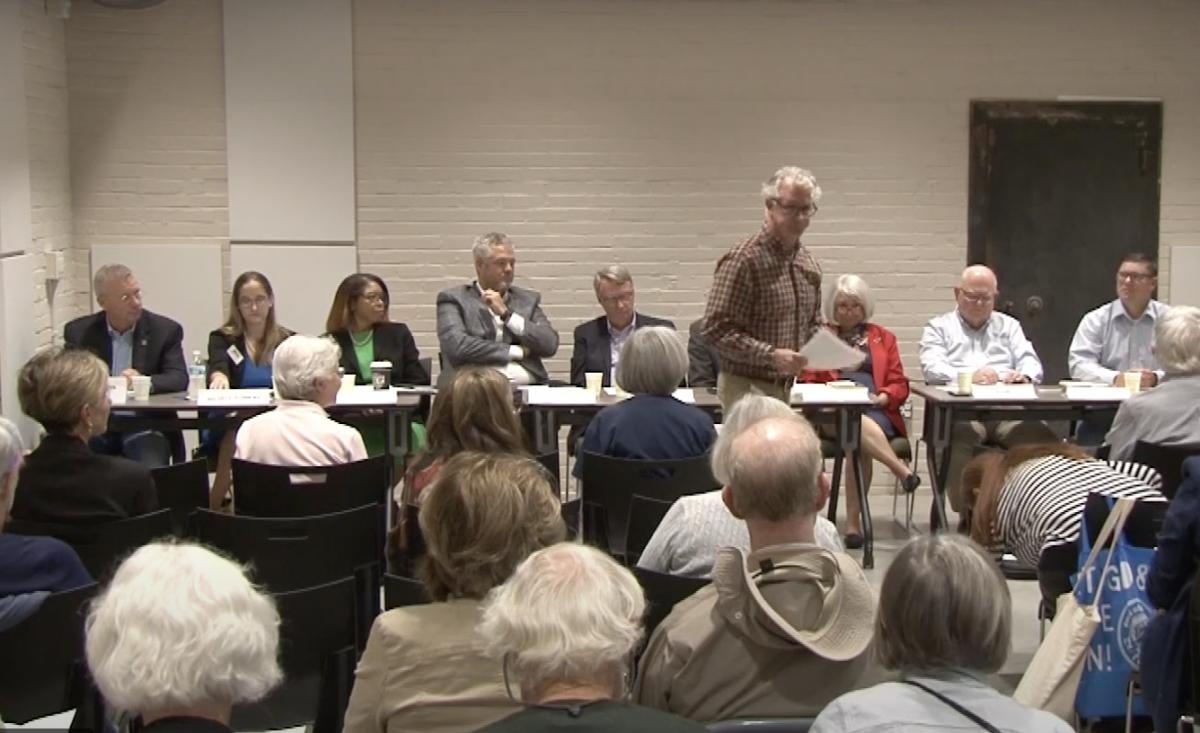More solar is coming, and two amendments to a resolution defining commercial installations were up for consideration at the planning commission’s September 26 meeting. Amendment 1 would require soil evaluation as a factor in site selection. Amendment 2, possibly an alternative, would require limiting solar to ten percent of each one hundred acres.
Transmission capabilities were also considered. Problems encountered in Queen Anne’s County were noted, and public comments included concerns that farmers could be penalized for having good soil. Noting that everyone’s interests must be taken into account, both amendments were judged to be consistent with our comprehensive plan and sent back to the council.
The commissioners participated that afternoon in a joint Town of Easton and Talbot County Planning Commission meeting. A change in zoning classification to build a warehouse and office buildings on two lots adjacent to Commerce Park was the focus of this meeting. Access exists, and the lots are not in a flood plain; but the town council had only recently received the stormwater report and had critical area concerns. A decision would not be made until the report could be reviewed.
October was named as Suicide Prevention Month; the 2023 Senior Care Plan was introduced; emergency legislation to replace the community center ice rink was introduced, and several other items were considered during the Talbot County Council’s September 27 meeting.
We were also reminded that three large developments are currently planned in Talbot County, and plans for the replacement of the Chapel Hill Elementary school were discussed at length. The state assists in funding, but its forecast for enrollment seems to be based upon past population growth rates. Chapel Hill is a work in progress; but White Marsh Elementary will get a new roof, and shade structures for our elementary schools were approved.
Back to solar, and the introduction of an amendment to Amendment 1 for solar installation. The goal of this amendment is to provide protection for croplands that will pass review of the Maryland Public Service Commission – and work in progress would be excluded from these requirements. There was discussion as to whether to amend Amendment 1 or add a third amendment. A third amendment will be passed back to the Talbot County Planning Commission for their consideration.
Watching these meetings allows us to appreciate that governing in a democracy takes time, and that this effort is worthwhile. These meetings consisted of far more detail and items of public interest than described here, and county meeting videos are available here.
We will have a new Talbot County Council in 2023, and candidates participated in a debate sponsored by the Chesapeake Bay Foundation at the Eastern Shore Conservation Center on Wednesday, September 28.
Scott Kane, former mayor of Chevy Chase, currently serves on a county committee and is recommending more communication with citizens. Keasha Haythe, with years of experience working on development projects on the Eastern Shore, suggested our comprehensive plan is our roadmap, and to address climate change we must have education, outreach, and partnering.
Phil Jackson, chief technology officer for Chesapeake Medical Imaging for 13 years and technology consultant, was praised by Corey Pack at a recent county council meeting for his assistance in addressing failing wastewater treatment in Wye Mills. Michele Dappert, a digital marketing specialist back home in Talbot County, believes we must do what it takes to support our comprehensive plan. She also recognizes that agriculture remains our single largest source of pollution and supports measures to reduce runoff. Pete Lesher, current county council vice president, is not only knowledgeable concerning Talbot County’s history and government, he recognizes the importance of coordinating efforts with municipalities.
Our candidates recognize that we must work together, and clean water is fundamental to life in a county with over 600 miles of shoreline. David Montgomery, a former assistant director of the Congressional Budget Office and Talbot County resident for 30 years, respects our rural atmosphere. Concerning efforts to reduce pollution in our Chesapeake Bay, he suggests there are “lots of good ideas – to be determined.” Lynn Mielke, a retired attorney committed to controlling growth to preserve our rural atmosphere, currently has no ideas for reducing pollution in the Chesapeake Bay, but is “on a learning curve.” Dave Stepp, a telecommunications specialist and owner of two small businesses, recognizes that nitrogen and phosphorus levels are high and that we must have clean water. He also believes we cannot be fully reliant upon green energy.
Chuck Callahan, Talbot County native, owner of a construction company and current president of the county council, agrees that “it all starts with clean water” and we “need to do a better job of communicating and studying impact fees.” Another debate is scheduled for October 9 at the Avalon, and a video of this debate is available on Talbot Spy.
Carol Voyles is a graphic designer/illustrator who retired to the Eastern Shore and became interested in politics. She serves as communications chair for the Talbot County Democratic Forum and lives in Easton.



Write a Letter to the Editor on this Article
We encourage readers to offer their point of view on this article by submitting the following form. Editing is sometimes necessary and is done at the discretion of the editorial staff.